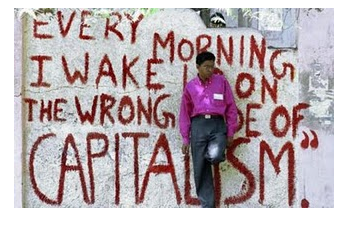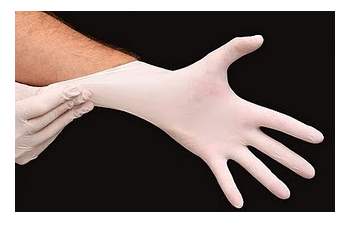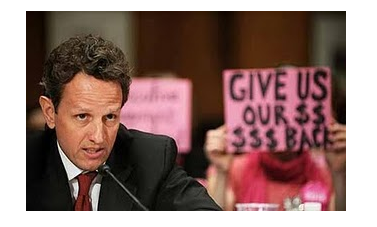More On Yesterday’s Plunge
 Courtesy of Karl Denninger, The Market Ticker
Courtesy of Karl Denninger, The Market Ticker
If you had any doubt about what I have been talking about during this entire ramp job off 666 – that the so-called "bull market" was in fact not much more than a handful of institutions buying shares with free Fed money and passing them between one another hoping to distribute them to you – you should be thoroughly disabused of your skepticism after yesterday.
"Revenge of the algorithms" writ large, basically.
We keep talking about how financial innovation has "helped consumers", "helped businesses" and "made markets more efficient."
Let me put this in nice, large letters for you:
That claim is one big fat LIE.
If you need anything more after yesterday to understand that all these "algos" have done is create systemic risk and permit a handful of very large institutions to siphon off more and more of your money into their pockets like an insane hoover vacuum cleaner on steroids, you need a lobotomy.
The crooners are of course out in force this morning, among them Jeff Immelt:
“This is a point in time when the world needs the U.S. to be a beacon of stability, a beacon of reliability,” Immelt said during an interview at the 92nd Street Y in New York with Norman Pearlstine, chairman of Bloomberg Businessweek. “The world doesn’t need the U.S. in a food fight right now, with everything that’s going on in Europe. We should be the safe harbor.”
But what’s his definition of this? Why, to make sure GE can continue to siphon off more and more money from the productive economy via GE Capital!
“Financial services is a very important industry in this country,” Immelt said. “Goldman Sachs has been a partner to GE for a long time. We trust them, they’ve done great work for us.”
 Yep – hinky derivatives deals are great for Goldman, and might be great for GE as well. For the rest of the world that actually produces something? Not so much.
Yep – hinky derivatives deals are great for Goldman, and might be great for GE as well. For the rest of the world that actually produces something? Not so much.
“This point about damning Wall Street isn’t good for the American economy,” Immelt said.

“Some theoreticians that convinced themselves that you can have a great, productive country that has no technology or manufacturing base — they’re just wrong,” Immelt said. “And I hope that gets beaten into the head of every American. Not that we’re anywhere close to Europe, but there are things that are going on there that ought to be cautionary tales for us.”
Ah, now there’s some truth! But where are all these things being made that Immelt is talking about? In America? Uh, no.
This is the problem in a nutshell, on a macro level. We have replaced factories with Wall Street scams. We have allowed Wall Street to take a few million dollar project in Jefferson County Alabama and turn it into a multi-hundred million dollar boondoggle that winds up costing the taxpayer massive multiples of the actual cost of the productive and necessary improvements to infrastructure.
In Greece this sort of chicanery has led to riots when the government, in bed with the thieves, decided to demand that their citizens pay for the scams and frauds. The people have said no, and intend to enforce their perspective. We’ll see who wins that one, and whether the Greeks control the government, or whether the government controls the people.
If the latter, the Greeks live under tyranny, not a representative government.
There was no glitch yesterday. What happened was a simple bid collapse. Selling was already going on to the tune of some 300 DOW points before the plunge. The FX markets – that is, the currency markets – where undergoing extreme levels of volatility.
But the algorithms – that is, automated computer trading systems that represent the so-called "innovation" that the big banks want to make damn sure continue to skim off pieces of the productive economy for them, triggered off and drove enough SELL orders to collapse all bids.
On a technical level what happened in the DOW is easy: NBBO, or national best bid and offer, was proved to be a JOKE.
That is, when the NYSE specialist system went into "slow mode", which they do as a protective measure, electronic trading went around it into the "second market."
That’s nonsense – the premise of NBBO is that this is simply not supposed to happen, in that if I come to buy I’m supposed to get the best (highest) offer, and if I sell I’m supposed to get the best (lowest) bid. When NBBO is circumvented by computer systems that are allowed to "trade around" the specialists that have started examining what’s going on you have a market that gets instantly gamed by the computers and in this case it caused acrash.
Let me be clear: Any trader or investor selling got filled at $0.01 in Accenture yesterday while the NYSE had a higher bid, irrespective of whether it took them 30 seconds to fill you or not, should, if there are actually cops on the beat, be able to force the trading venue that filled them to make good on the difference that they were robbed of.
Of course actually enforcing NBBO in this fashion would likely bankrupt every one of the venues and/or brokerages responsible for the ‘reach around", so you can bet it won’t happen – you, the trader or investor, will get hosed instead.
But on a fundamental level there’s a bigger problem, and it goes back to what I’ve been talking about for the last three years.
We committed a serious error worldwide during 2008 and early 2009. Instead of forcing bankrupt financial firms to eat their own cooking and fail, backstopping only depositors and spending a couple of trillion dollars on that (while literally closing the big banks) we instead decided to hide their insolvency through outright accounting fraud (getting rid of "mark to market") and transferring risk to sovereign balance sheets.
You can fix an illiquid system with more liquidity. But if the problem is insolvency – that is, firms have more debt than they have assets and are in fact bankrupt then more liquidity makes the problem worse!
Why? Because all liquidity is in fact debt.
You can’t add more debt to someone that has too much debt and make their situation better. It makes the situation worse! Accounting gimmicks only work for a while, in that they can change how one reports assets and liabilities but cash flow can’t be altered by accounting gimmicks.
Ultimately, cash flow always wins. As I have repeatedly pointed out when evaluating a business I first spend my time on the income statement and cash flow figures. You’re never going to get away with fudging the deposit tickets at the bank, and the money you claim to have either exists or it does not, and is easily verified.
President Obama had the opportunity to come into office and close every large financial institution that, on a mark-to-market basis, was insolvent. This would have included (and still does include) virtually every one of the large banks. Firms like Wells Fargo with $1.7 trillion in off-balance-sheet "assets" have only a tiny amount of actual equity behind that debt – if those alleged "assets" are in fact worth just a tiny amount less than claimed the firm is insolvent. Since they’re off-balance-sheet we have no way to know.
But what we do know is that every week the FDIC proves two things:
-
Banks are and have been lying about asset valuations, as in virtually every case when they close a bank we suddenly discover that assets have been claimed at values 20, 30, 40 or even 50% above actual value.
-
The FDIC knows right now what the true values are. It has to in order to be able to tell us what the projected loss to the deposit fund is! Even for a tiny bank it would take days to determine valuations unless they are fully aware of the false claims for days, weeks or even months before they come in and close the firm.
Over the last two years the insolvency in the system has gotten worse, not better. We have hidden it and lied, but we haven’t fixed it and can’t because the system remains overlevered and the firms remain insolvent – it’s just better-hidden.
 The large financial institutions took the "liquidity" and used it to play games in the equity market. But this generates no real liquidity in the equity markets – that is there is no depth in the market itself, and as such when the computers come in to sell there’s nobody on the other side willing to buyand the bid collapses.
The large financial institutions took the "liquidity" and used it to play games in the equity market. But this generates no real liquidity in the equity markets – that is there is no depth in the market itself, and as such when the computers come in to sell there’s nobody on the other side willing to buyand the bid collapses.
This madness must be stopped, but doing so means doing what we should have done in 2008 and 2009 – forcing every financial institution to eat it’s own cooking and absolutely barring financial firms with access to fed and government liquidity from trading or speculating in the markets.
Glass-Steagall would have prevented the illusion of liquidity from existing and thus what happened yesterday wouldn’t have. Of course without that illusion we would have also not powered the S&P from 666 to 1219.
So choose your poison folks: either we start telling the truth and have a market that more-clearly reflects actual buyers and sellers, or we will continue to run the risk of the sort of collapse we saw yesterday – and there will be more of them.
Photos courtesy of Jr. Deputy Accountant


